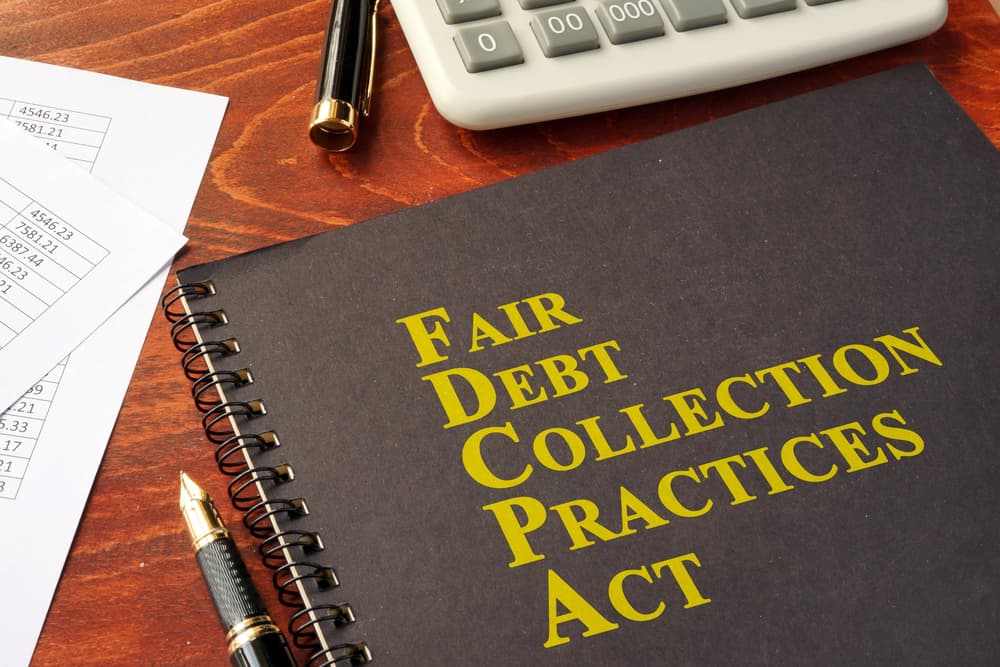The Fair Debt Collection Practices Act (FDCPA) is a federal law that protects consumers from abusive, deceptive, and unfair debt collection practices. While the law protects consumers, those struggling with debt and financial stress may not understand it.
If you are a resident of San Diego and debt collectors harass or mistreat you, you have rights under the FDCPA. Our San Diego FDCPA lawyers can help you understand these rights and take action to protect yourself from illegal debt collection practices.
What Is the FDCPA?

Congress enacted the FDCPA in 1977 to protect consumers from abusive and unfair debt collection practices. The law applies to personal, family, and household debts, including credit card debt, medical bills, and other types of consumer debt.
Under the FDCPA, debt collectors are prohibited from engaging in certain practices, such as:
- Calling you before 8 a.m. or after 9 p.m. without your permission
- Contacting you at work if you have told them not to
- Using threatening or abusive language
- Falsely claiming that you will be arrested or have committed a crime
- Threatening to take legal action against you when they do not intend to do so
- Contacting third parties, such as your family or employer, about your debt
Debt collectors are also required to provide you with certain information, such as the amount of your debt, the name of the creditor, and your right to dispute the debt.
Common FDCPA Violations
Despite the FDCPA’s protections, many debt collectors continue to engage in illegal and abusive practices. Some common FDCPA violations include:
Harassment
Harassment is one of the most common types of FDCPA violations committed by debt collectors. Harassment can take many forms but generally involves any conduct that annoys, abuses, or harasses the consumer.
Examples of harassing behavior may include:
- Using threatening or abusive language: Debt collectors may not use profanity, threats of violence, or other abusive language to intimidate or scare consumers into paying their debts.
- Calling repeatedly: Debt collectors may not call consumers multiple times a day or at odd hours, such as early in the morning or late at night, in an attempt to wear them down or catch them off guard.
- Contacting consumers at inconvenient times or places: Debt collectors may not call consumers at work or other inappropriate places, or at times when they know the consumer cannot talk.
Harassment is not only stressful and emotionally draining for consumers, but it is also illegal under the FDCPA. If a debt collector harasses you, our San Diego lawyers can stop the harassment and hold the collector accountable for their actions.
False or Misleading Statements
Another common type of FDCPA violation is the use of false or misleading statements by debt collectors. These statements can trick or pressure consumers into paying their debts, even if the debts are not valid or the consumer is not legally obligated to pay them.
Examples of false or misleading statements may include:
- Falsely claiming that the consumer will be arrested: Debt collectors may not threaten consumers with arrest or criminal charges if they do not pay their debts, even though failure to pay a debt is not a criminal offense.
- Misrepresenting the amount or legal status of the debt: Debt collectors may not inflate the amount of the debt or claim that the debt is legally enforceable when it is not, to pressure the consumer into paying.
- Falsely claiming to be an attorney or government official: Debt collectors may not impersonate attorneys or government officials to intimidate consumers or make their threats seem more credible.
False or misleading statements can lead consumers to make payments or agree to payment plans that they cannot afford or are not legally obligated to make.
If a debt collector makes false or misleading statements, our San Diego lawyers can challenge the validity of the debt and seek damages for any harm caused by the collector's actions.
Unfair Practices
In addition to harassment and false or misleading statements, debt collectors may also engage in unfair practices that violate the FDCPA. These practices can take many forms, but generally involve any unfair or unconscionable conduct in the collection of a debt.
Examples of unfair practices may include:
- Adding unauthorized interest, fees, or charges to the debt: Debt collectors may not add interest, late fees, or other charges to the debt that are not authorized by the original contract or by law.
- Depositing a post-dated check before the date on the check: If a consumer gives a debt collector a post-dated check, the collector may not deposit the check before the date on the check unless they have the consumer's express permission to do so.
- Collecting on a debt that has been discharged in bankruptcy: If bankruptcy discharged the debt, the debt collector may not continue to collect on the debt or attempt to hold the consumer personally liable for it.
You need an experienced FDCPA lawyer to identify these unfair practices. Our San Diego lawyers can review your case and determine whether the debt collector has engaged in any unfair practices that violate your rights under the FDCPA.
Failure to Provide Required Information
Finally, debt collectors may violate the FDCPA by failing to provide consumers with the required information about their debts and their rights under the law. This information is critical because it allows consumers to make informed decisions about how to respond to collection efforts and protect their interests.
Examples of required information that debt collectors must provide include:
- The amount of the debt: Debt collectors must inform consumers of the amount of the debt, including any interest, fees, or charges that have been added to the original amount.
- The name of the creditor: Debt collectors must provide consumers with the name of the creditor to whom the debt is owed so that the consumer can verify the validity of the debt.
- The consumer's right to dispute the debt: Debt collectors must inform consumers of their right to dispute the debt within 30 days of receiving the initial collection notice and must provide instructions on how to do so.
Failure to provide this information can make it difficult for consumers to exercise their rights under the FDCPA and challenge the validity of the debt.
If you have not received the required information from a debt collector, our San Diego lawyers can demand that the collector provide the information and take legal action if necessary to protect your rights.
By understanding the different types of FDCPA violations and how they can impact consumers, our San Diego lawyers can provide targeted and effective legal assistance to those who have been the victims of abusive or unfair debt collection practices.
If a debt collector harassed, misled, or treated you unfairly, don't hesitate to contact our lawyers for a free consultation and case evaluation.
Your Rights Under the FDCPA
As a consumer, the FDCPA can help protect you from abusive and unfair debt collection practices. These rights include:
- The right to request validation of your debt: If you dispute the amount or validity of your debt, you can request that the debt collector provide you with written verification of the debt.
- The right to stop communication: You can send a written request to the debt collector asking them to stop contacting you. Once they receive your request, they can only contact you to inform you of specific actions, such as filing a lawsuit.
- The right to sue: If a debt collector violates your rights under the FDCPA, you can sue them in federal or state court and potentially recover damages and attorney's fees.
Our San Diego lawyers can help you understand and exercise these rights, and can represent you in court if necessary to protect your interests.
How Our San Diego Lawyers Can Help You
If you are being harassed or mistreated by debt collectors in San Diego, our lawyers can help you in several ways:
- Reviewing your case: We can review the details of your case and determine whether the debt collector has violated your rights under the FDCPA.
- Advising you of your options: We can advise you of your legal options and help you decide on the best course of action for your situation.
- Communicating with debt collectors: We can communicate with debt collectors on your behalf to ensure that they comply with the FDCPA and respect your rights.
- Negotiating with creditors: In some cases, we may be able to negotiate with your creditors to reduce or settle your debt on favorable terms.
- Representing you in court: If necessary, we can represent you in court to hold debt collectors accountable for their actions and seek damages and other relief.
Our San Diego lawyers have extensive experience handling FDCPA cases and are committed to protecting the rights of consumers. We understand the stress and anxiety that can come with dealing with debt collectors, and we are here to help you find a solution that works for you.
The Importance of Acting Quickly
If you are being harassed or mistreated by debt collectors, act quickly to protect your rights. Waiting longer makes it harder to hold debt collectors accountable for their actions.
In addition, you face time limits for filing FDCPA lawsuits. In most cases, you must file your lawsuit within one year of the date of the violation. If you wait too long, you may lose your right to sue and recover damages.
Our San Diego lawyers can help you understand the time limits that apply to your case and can take action to protect your rights. We offer free consultations to help you understand your options and decide on the best course of action for your situation.
The Benefits of Working with Our San Diego Lawyers

Working with our San Diego lawyers can end abusive or unfair debt collection practices through our:
- Knowledge and experience: Our lawyers have extensive knowledge of the FDCPA and experience handling a wide range of debt collection cases. We can use this knowledge and experience to help you navigate the complex legal system and protect your rights.
- Personalized attention: We understand that every case is unique, and we take the time to listen to your story and understand your individual needs and concerns. We provide personalized attention and tailor our approach to your specific situation.
- Aggressive representation: We are not afraid to take on tough cases and fight for the rights of our clients. We will aggressively represent your interests and work tirelessly to hold debt collectors accountable for their actions.
If you are dealing with abusive or unfair debt collection practices in San Diego, don't hesitate to contact our lawyers for help. We are here to protect your rights and help you find a solution that works for you.
Contact Our San Diego Lawyers Today

The FDCPA provides important protections for consumers, but you need an experienced lawyer to provide relief from this stressful and overwhelming experience.
Our San Diego lawyers can explain your rights under the FDCPA and protect you from illegal debt collection practices. We offer personalized attention, aggressive representation, and a commitment to fighting for the rights of our clients.
If debt collectors in San Diego harass or mistreat you, don't wait to seek help. Contact our San Diego consumer protection lawyers today for a free consultation and learn more about how we can protect your rights and find a solution that works for you.